Skill Wedges - An RPG Subsystem
I’ve been noodling on an RPG skill system that maps roughly to how skills work in the real world:
- It takes effort to improve at something
- The better you are, the harder it is to improve
- You can become so-so at a new thing pretty quickly
- There’s always an opportunity cost for how you spend your time
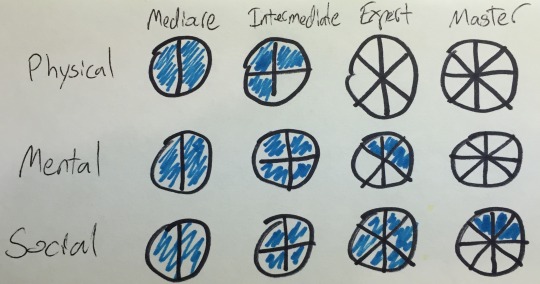
The skill system I’m proposing is agnostic to game mechanics around skill checks. It could slot into a d20, Fate, diceless, or other conflict resolution system with only slight tweaking.
Inspiration
This system takes inspiration from the ‘countdown clocks’ used in Apocalypse World - as players take more damage, they fill in wedges of ‘Harm’ and if the clock fills up, bad things happen.
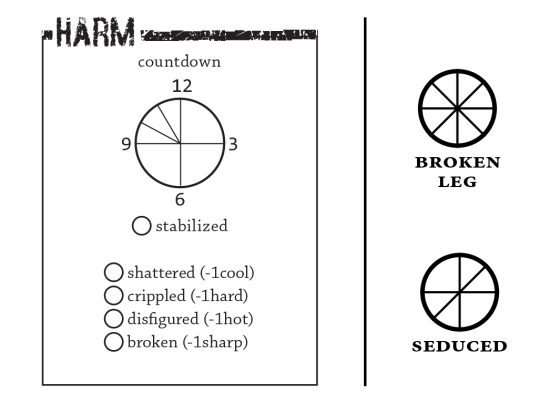
Blades in the Dark uses clocks too, but more broadly. Here, clocks can track obstacles, dangers, enemy faction’s schemes, and long term projects.
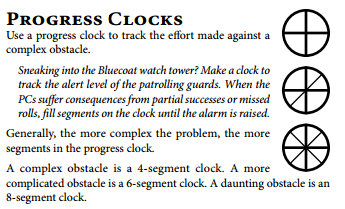
Clocks for Skills
Adapting the Progress Clocks to represent skills is pretty easy. Each skill has a series of clocks with each clock containing more wedges. Each wedge represents a unit of time invested in getting better at the skill. A completed clock represents a new milestone in mastering that skill.
In this basic example, there are only three skills / stats: Mental, Physical, Social. There are also four levels of mastery: Mediocre, Intermediate, Expert, Master.
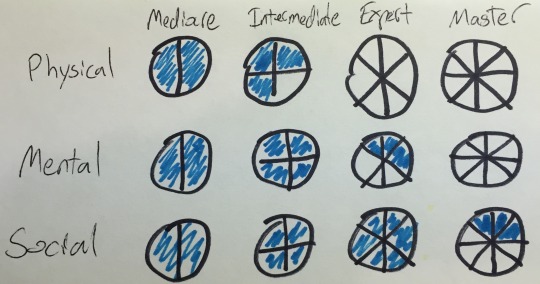
Of course, you can adapt this to have any number of skills and mastery levels. The granularity can be broad, like the example above, or very specific.
During character creation, players can have a budget of wedges to allocate as they’d like. Being amazing at one thing means they’re probably mediocre at most other things. Opportunity cost is always fun - make the players decisions matter!
As the story progresses, players can improve their characters’ skills through deliberate practice. If a character has X hours of downtime, they might earn a wedge to put in any skill. They’ll face a dilemma of investing in something they're good at, which might not have an immediate bonus, or investing in a weakness where they might see fast improvement.
The number of hours corresponding to a wedge could vary from one campaign to the next, depending on the type of game the players want to experience. Heroic fantasy might have players improving quickly while games in the modern era might have fairly slow skill progression. Here’s one possible way of thinking about it:
- Becoming an expert might take 10,000 hours (where expert = among the best in the world)
- That’s 250 full time workweeks of improving, or 56 months, or ~5 years
- However, many skills might take way fewer hours to become an expert
- Regardless, it might take much less time to become pretty good at something
Depending on the system, characters might be able to hire (or win over) an incredible instructor who causes them to earn more wedges per unit of time. Likewise, there might be benefits to focus: if a character dedicates enough time / week to a specific skill, they might get bonus wedges.
Variations
A designer can make skills as broad or specific as they want (e.g. swimming or yo-yoing as skills). Players might be able to create their own skills, as long they’re of the right granularity. Games like Fate and Risus already allow players to come up with their own skills, this just adds a bit of structure to improving them.
Many RPGs have a split between skills and abilities. In D&D for example, having high Dexterity (ability) makes one better at Slight of Hand (skill). The Skill Wedge approach can handle this by having two types of wedges, one for abilities and one for skills. I’d imagine that ability wedges aren’t given out much after character creation. Having a high ability might give bonuses to related skills, such as getting bonus wedges. For example, someone with high Wisdom (ability) might be able to fill in two spots per wedge spent when improving their Medicine (skill).
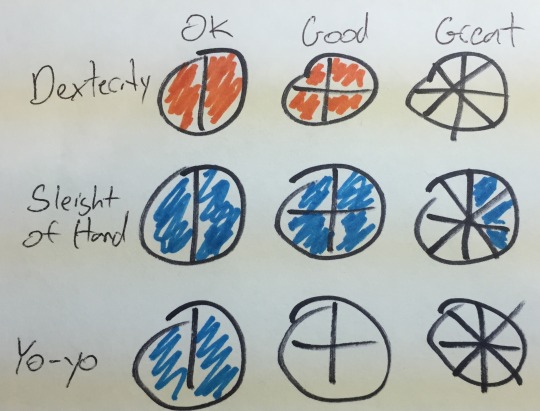
If a game designer wants to get fancy, they can set up different learning curves for different skills. Playing guitar is a skill where there is a steep initial curve as you get your fingers used to gripping the strings and forming the right chord shapes. However, once you can create a clean tone and play barre chords, it’s pretty easy to advance to intermediate skill and play a lot of different songs and styles. Becoming an expert is still pretty tough, though. Here’s what the corresponding skill progression might look like:

While wedges might only be awarded during character downtime, players might also earn specific wedges based on the story. For example, if the characters had to hunt through the archives for a specific bit of lost lore, they might all gain a wedge in History.
Clocks and Wedges Everywhere
If wedges represent units of time, then it’s easy to integrate this skill system with other types of clocks. To borrow the Blades in the Dark example, a character can use their ‘downtime wedges’ to improve one skill a lot, a few skills a little, work on a project, gather intelligence, or some combination of the above. This time based economy can really highlight the opportunity costs of different actions and make players feel that their choices have weight. It also allows nice short-term / long-term tradeoffs (e.g. I really want to improve my swordsmanship but scouting the enemy’s territory will make the next mission much easier).
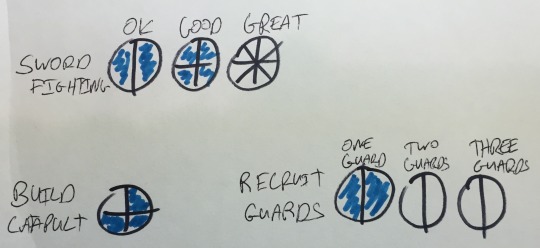
This type of gameplay also works well between in-person sessions. At the conclusion of one session, players might be awarded three wedges of activity for their character to do before the next session. Thus, there’s a structured way to keep the game going during the inter-session break.
I might prototype a game that’s mostly this - allocating time to accomplish short- and long-term goals. It might not be an RPG - I can see this working as a board game.
I Know Kung Fu
Another game that might be fun to prototype: an RPG where players can download new skills (like in the Matrix). Players would have a pool of skill wedges that they could reallocate before each mission. A character might be more adept at some types of skills due to underlying abilities so wedges go further. Some missions might involve stealing / acquiring data-cards with new skills.
Final Thoughts
Anyhow, this is just something I’ve been noodling on for a bit. We’ll see if it makes it into a full RPG at some point. I’d love your thoughts - feel free to comment below!